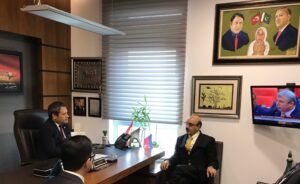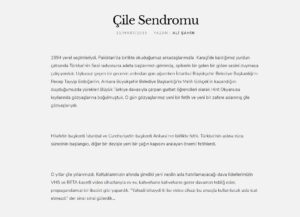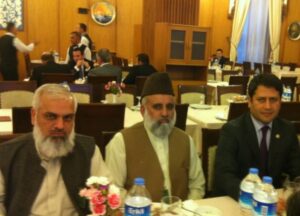Abdullah Bozkurt/Stockholm
A Pakistani-educated chief administrator of the Turkish Parliament has asked for the incorporation of a special Chechen unit in Turkey’s Armed Forces (TSK), saying the military needs warriors to complete missions abroad for the sake of the entire Muslim world, or Ummah, and that it can no longer confine itself merely to the protection of Turkish borders.
Ali Şahin, a 50-year-old die-hard Islamist who was groomed as a young man in Pakistan in the 1990s, has for some time been lobbying for the establishment of a foreign fighters unit composed of Chechens in the Turkish army, Nordic Monitor has learned. His efforts picked up steam amid amendments introduced in parliament that would redefine the mandate of the Turkish military.
After graduating from a religious imam-hatip high school in Turkey, Şahin was sent to complete his higher education in the Pakistani city of Karachi, where he had contact with other Islamist activists. Upon his return he worked in an unofficial capacity as an advisor to a member of parliament from a small Islamist party. In 2011 he was brought into Turkey’s ruling Justice and Development Party (AKP) by President Recep Tayyip Erdoğan, who not only made him a member of parliament but also later appointed him as a deputy minister in his cabinet.
Now serving as the chief administrator in parliament, Şahin wields significant influence in the legislative as well as executive branches and peddles radical views in government agencies, helping nurture foreign students from Southeast Asia with a political Islamist agenda similar to the Muslim Brotherhood vision and promoting a sort of caliphate leadership for his boss Erdogan.
His links to Islamist groups in Kashmir, some radical, have only grown stronger throughout years. Closely working with Pakistani diplomatic missions in Turkey, he even served as an advisor for Pakistan’s Consulate General in Istanbul for a while.
Ali Şahin’s article that pushed the idea of enlisting Chechen fighters in the Turkish army:
In recent years, he has not been shy in expressing the views that he had previously been pushing discreetly in AKP headquarters, where he worked in external relations.
“Why shouldn’t we deploy the Chechen warriors we’re related to [as kin] within our own army?” asked Şahin in an article he posted in his blog on June 16, 2019. “It is imperative that the TSK extend its military and security horizons beyond 780,000 square kilometers [of Turkey’s territory], just as Turkey’s sphere of influence is the same as that of the ummah [entire Muslim world],” he added.
Praising how the Chechens resisted the Russians a century ago and renewed their fight in the 1990s, Şahin described the Grozny resistance as a heroic fight that could be the subject of a Hollywood movie script. “Some nations are warriors. They are born warriors with their bodies and souls,” he wrote, stressing that “when the warrior spirit and faith of the Chechens, who were reintroduced to Islam after the long pressure of communism, were merged, a tremendous fighting power and spirit emerged.”
Şahin’s lobbying campaign to enlist Chechens in the Turkish army intensified in the aftermath of a bill that paved the way for the Turkish military’s transformation from a conscript-based army to a professional military that can offer job prospects for those who want to join the military and get paid for their service. In the aftermath of a 2016 false flag coup that was orchestrated by Erdogan to create a pretext for an unprecedented purge, more revisions were introduced in parliament by the AKP as amendments to the law that regulates the mandate of the Turkish military. At this juncture Şahin saw the opportunity to push his idea of incorporating foreign fighters in the army, which is NATO’s second largest in terms of manpower.

According to Şahin and many senior Islamists in the governing AKP, President Erdogan has been fighting not only for Turkey but also for all Muslims around the world. For that, the entire structure of the Turkish government, from the military to the foreign service, from the intelligence agency to the police, must be restructured.
“I also find this point [enlisting Chechens] extremely important in terms of breaking some taboos of the General Staff,” Şahin pointed out. “It should be remembered that the TSK is now not only the army of 780,000 square kilometers [modern Turkey’s landmass], but also the army of all the oppressed in the world and the [Muslim] ummah,” he proclaimed.
In order to support his views, Şahin gave an example of the Gurkhas of Nepal, who were recruited as soldiers for the British Army. Known as fierce fighters, the British benefited from their potential and used them in fights in many wars, Şahin said. He predicted that the Chechens could easily integrated into the Turkish army because of the kinship between Turks and Chechens, in contrast to the Gurkhas and the British.
In recent years the Turkish army has established special units of Arab and Turkmen fighters in Syria and trained and armed them to fight on the front lines. In all the military interventions in Syria since 2016, such units were used in capturing towns and cities in the north of the country. Some of this fighters were later deployed in Libya and Azerbaijan to advance the political and ideological interests pursued by Erdoğan and his Islamist and nationalist associates.
Chechens have a sizable diaspora community in Turkey supported by the Erdoğan government. Some of the fierce fighters among jihadist groups in Syria were mainly composed of Chechens and Uighurs. Şahin claimed the major powers noticed the Chechens’ warrior potential and undermined their resistance by deliberately guiding them to terror groups.

Şahin is also one of the key operatives who handles the networking between Islamists in Turkey and Southeast Asia. The web of links he developed between February 1990 and February 1997 in Pakistan has only grown throughout years. He often uses a front organization called the South Asia Strategic Research Center (Güney Asya Stratejik Araştırmalar Merkezi, or GASAM) on a parallel track to facilitate the linkages. Groups from the disputed region of Kashmir often visit Şahin as part of lobbying efforts.
In parliament he represents the border province of Gaziantep, home to many Turkish and non-Turkish al-Qaeda and Islamic State in Iraq and Syria (ISIS) cells. Some of the worst terror attacks blamed on ISIS were perpetrated by groups that maintained a strong presence in his home province.
He was a foot soldier during his youth, canvassing the neighborhood to spread propaganda on behalf of his mentors in the Islamist Welfare Party (RP), a party where Erdoğan’s political career was made when he was elected mayor of Istanbul in the local elections of 1994. When the election results were announced, Şahin was in Karachi. He was weeping from joy and saying that “the co-conquest of Istanbul, the capital of the Khilafet, and Ankara, the capital of the [Turkish] Republic, is the beginning of Turkey’s return to its origins, in other words, important conquests that open the door to a new era.”
In addition to working as the chief administrator of parliament, Şahin also serves as chairman of the Turkey-Pakistan Parliamentary Friendship Group. For his services on behalf of the Pakistani government, President Arif Alvi in 2019 awarded Şahin the Sitara-i-Quaid-i-Azam (Star of Excellence), the country’s most prestigious civilian award.
The promotion of Erdoğan’s firebrand Islamist ideology has already taken root in Kashmir. Şahin said the visiting president of Azad Jammu and Kashmir, Sardar Masood Khan, told him on May 3, 2019 that “the people of Kashmir see their own survival in Turkey’s survival and accept Recep Tayyip Erdogan as their leader in this sense.”

Turkey’s ruling Islamists including Şahin do not hide their ambitions of pursuing a neo-Ottoman vision. In an interview with the Kurtuba magazine in June 2017, Şahin said: If you are a global power, you must have dreams, thoughts and strategies about far away [territories]. I carry the genes of an [Ottoman] Empire in my cells. I can’t confine my dreams to 780,000 square meters [Turkey’s land territory].” Branding the entire era of the modern republic in the aftermath of World War I as a “vegetative state,” he claimed Turkey’s interest in Southeast Asia is part of its inheritance from 1,000 years ago.
“The psychology of fear and the inferiority complex that we were exposed to after the [collapse of] the Ottoman Empire confined our people to these narrow boundaries [of the Turkish Republic]. As part of a strategy, we have lived in a vegetative state for 90 years. We need to wake up from this narcotic state.”













